
Reader Robert Baker in Australia writes: ‘I recently secured two piping medals at auction in the UK. They mention the Lorn Ossianic Society and the ‘Loch Lubnaig Gathering’.
‘These very interesting pieces are now on their way to me in Australia. Once I receive them, further research will have to be undertaken.
‘I also picked up a ‘Silver Star’. I will keep you updated as I will eventually will find a home for them back in Scotland.
‘This covid mess is bringing out some some bargains, but also a piece of piping history could be lost at the same time; once gone never to return.’
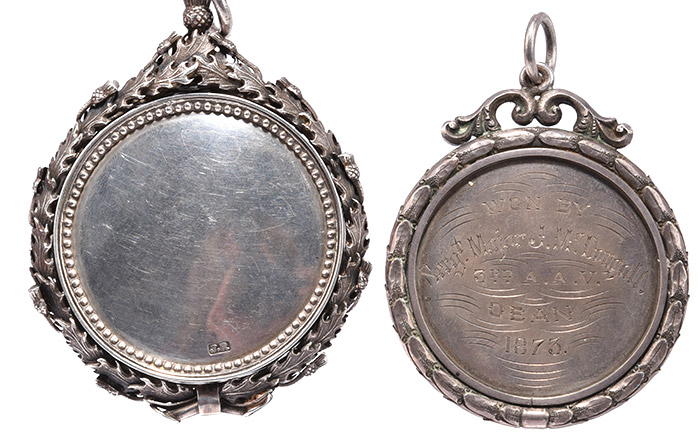
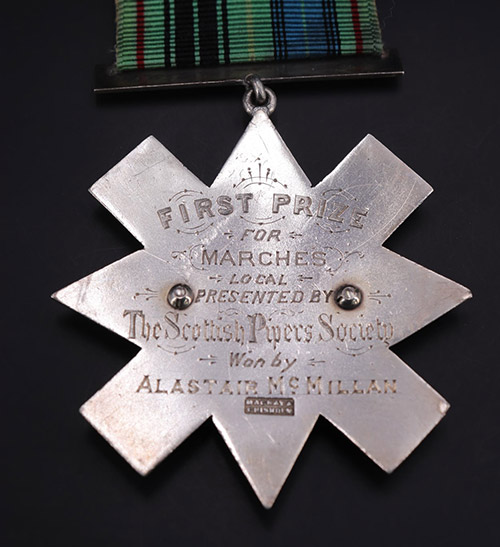
A hearty well done to Robert. The Silver Star mentioned (reverse shown above) is from what is now the Royal Scottish Pipers’ Society. They are described on the medal minus the ‘Royal’ assignation so it must be pre-1930s, before, I think, member King Edward Vlll garnered it for them.
I wonder if the Loch Lubnaig Gathering is a forerunner of today’s Lochearnhead Games? The loch is only a few miles further south.
Our correspondent Mr Chalmers (see Comments) is absolutely correct in what he says as regards the advantage of having piobaireachd players in a pipe band. The old attitude as espoused by Mr Whitelaw in our report yesterday has, thankfully, been superseded by this simple precedent: the better the piper, the better the band.
In my early day not all pipe majors appreciated this, or rather were forced to work with what they had. Get a good front rank, fill the spaces behind with ‘good band players’, those who could blow a tone and finger on the beat. Technique? Get it in if you can but not if it compromises unison.
A fair enough approach in the circumstances and many’s the World Championship won with just such a battle plan. It would not be good enough today however. We search the ranks of the winning Grade 1 bands and we find them peppered with piobaireachd players, competing soloists, regulars at Oban and Inverness. The rest are good enough to participate if they were so inclined.
[wds id=”2″]
Not only does playing piobaireachd teach pipers to blow steadily, they learn to keep a good instrument and to tune it accurately. The very essence of the music is in the instrument. Its length dictates that the pipe must be perfectly set up. The player must be comfortable for 10 to 15 – twice as long as the average band medley.
There’s finger control too, precision placement at the exact moment of delivery. That said, there have been several Gold Medallists who would not get a game at the top of today’s Grade 1. Their fingers just don’t move quickly enough.
The attitude to piobaireachd music began to change in the late 1960s. Donald Shaw Ramsay recording the Old Woman’s Lullaby with Invergodon Distillery was the start. Bob Shepherd and Dysart kept things going in the 70s with the Desperate Battle of the Birds.
There have been many concert renditions of bands playing piobaireachd since. Who can forget SFU bringing the house down with the Lament for Robert Reid at their Worlds Week concert in Glasgow a few years back?
It was the biggest cheer of the night and proof positive that ceòl mòr had crossed the rubicon into the arms of a chastened pipe band movement.
And now we have brilliant bandsmen such as Donald MacPhee, Alastair Dunn, Jack Lee, Alan Bevan and Stuart Liddell proving that it is possible to succeed at the highest level in both solo and band disciplines.
EUSPBA newsletter: ‘The good news just keeps on coming. A few weeks ago a report from the Southern Branch listed the Games in the branch which were going to run this fall. Two long time fixtures on the EUSPBA calendar announced this week that they too were prepared to open, and they have been sanctioned.
‘The Capital District Scottish Games will be held on September 4th at the Altamont Fairgrounds in Altamont, NY. This year’s event will only have band contests as New York State just removed restrictions on Tuesday. Also joining the list of operating games is the Virginia Scottish Games on September 4th and 5th, at The Plains, VA.
‘The Games plans on having a full slate of solo and band contests. Good luck to all the Games organizers coming back after a difficult year and a half! Grandfather Mountain Highland Games (In Person) – July 10th-11th.’
This is encouraging news and all we need now is a sanction for travel between the UK and the US and we can see our kilted friends out west once more.
The decision by the Piobaireachd Society to continue their 2020 set tunes list for 2022 is the correct one. There had been suggestions that if it didn’t change pipers would be restricted in the tunes they would learn or would be taught.
Fortunately the lists for both Gold and Silver Medals are ‘own choice’ so there is plenty of opportunity to study new stuff and submit it if preferred to what was learned for 2020 or 2021.
The Senior list is fixed, but the experts in this field can spend the extra time learning all ten pieces and have more to choose from when the time comes to choose their six for Oban and Inverness 2022.
-
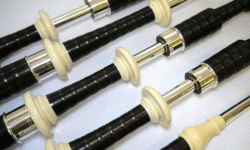 Bagpipes – DN4A – High Quality Set in Plain SilverPrice range: £200.00 through £2,052.00
Bagpipes – DN4A – High Quality Set in Plain SilverPrice range: £200.00 through £2,052.00 -
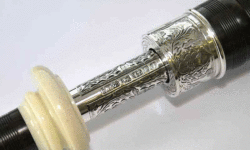 Bagpipes – DN5 – The Finest Bagpipe AvailablePrice range: £300.00 through £3,424.00
Bagpipes – DN5 – The Finest Bagpipe AvailablePrice range: £300.00 through £3,424.00 -
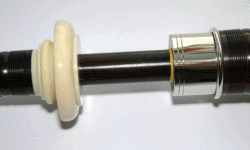 Bagpipes – DN1, High Quality InstrumentPrice range: £100.00 through £1,250.00
Bagpipes – DN1, High Quality InstrumentPrice range: £100.00 through £1,250.00















Regarding the Loch Lubnaig medal, a report in the Stirling Observer 6th Sept 1860 says that Scrymgeour won a set of silver mounted pipes for winning the piobaireachd. Peter McClaren was second and McLeod of 79th Highlanders was third